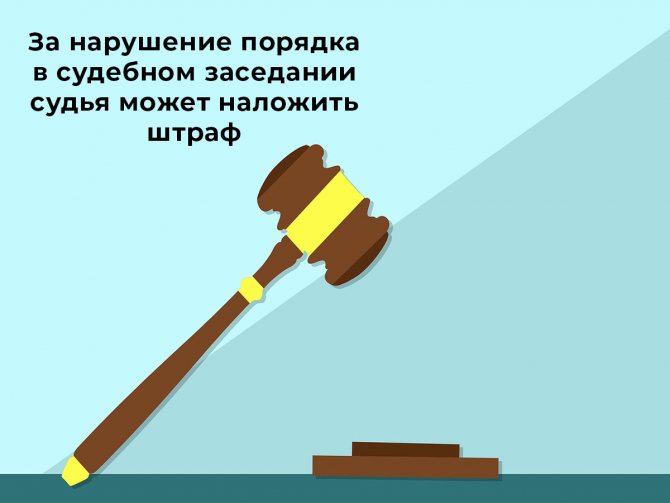When they talk about how to behave in court, they usually remember Art. 158 Code of Civil Procedure of the Russian Federation or Art. 154 Arbitration Procedure Code of the Russian Federation. But they relate to the behavior of the parties directly at the court hearing. And although this is the central stage of the civil and arbitration process, it still needs to be reached.
In addition to procedural norms, there are also informal rules of conduct that should be known and followed.
First of all, this article will be useful to ordinary people who do not often go to courts. The information presented here will help you feel more confident in court and avoid common mistakes. These rules apply to all participants in the process: plaintiff, defendant and third parties.
It will also never be a bad idea for practicing lawyers to repeat the seemingly well-known rules of conduct.
Getting ready for the court hearing
The day before, make sure you have all the documents that may be needed in court ready. You should have with you not only their originals, but also copies.
Be sure to take a pen (preferably two), a notepad and several sheets of blank paper. What if you need to write a petition?
And don't forget your passport. They won't even let you into the courthouse without it.
Put it all in your bag in advance so that you don’t forget anything in a hurry on the day of the meeting.
Separately, it is worth mentioning the requirements for appearance. Tracksuits, T-shirts, shorts, etc. are not allowed. Otherwise, you may be turned away at the entrance.
On the other hand, you shouldn't hang yourself from head to toe with expensive jewelry like diamond rings, gold chains and platinum Swiss watches that cost several hundred thousand dollars.
The correct attire for attending court is a simple, clean business suit. The optimal color is classic: dark blue, gray, black. And don’t forget to iron your suit. Clean shoes are a must.
Regarding perfume: a little bit is possible, but don’t get carried away. You shouldn’t wear too much perfume so that you don’t smell of French perfume throughout the entire courtroom or judge’s office.
A separate recommendation for girls: too frank and provocative appearance is unacceptable. No miniskirts, deep necklines, transparent fabrics or overly bright cosmetics.
Let's take just one example
Question: How can I prepare for a custody battle and get the judge to take my side?
“I think the circumstances have to be on your side for the judge to be there. If you are a responsible person, you work, you earn money, you have a clean house with all the necessary conditions, you will receive the sympathy of the judge. Women most often receive custody of children, no matter how unfair it is sometimes. Make sure that your conditions are much better than the woman can offer and then the judge will help you."
“The judge will accept the side that is shown to him in the best possible way. But no matter what both sides present to the judge, only he will decide. If your ex-partner screwed up, like doesn't have a job, or drinks, or something like that, and you don't, then you're more likely to get the baby. You have to make the judge see how positive you are."
“A judge is by definition a neutral third party. He won't "take sides." Any attempt you make to “get him on your side” will be considered an attempt at bribery or insult, which will undoubtedly work against you.”
The road to court: punctuality is everything
Being late to court is the last thing to do, so leave early. The fact that you got stuck in a traffic jam will not be a valid reason for the court. The judge will, of course, postpone the hearing to another day due to your failure to appear, but he will draw appropriate conclusions about your punctuality.
This, of course, should not affect the outcome of the case, but... the judge is also a person and everything human is not alien to him.
If the reason is valid, for example, illness, then notify the judge or his assistant in advance and ask to postpone the hearing or reschedule it for another day.
In other cases, it is better to arrive a little earlier.
But the court hearing itself may begin late, sometimes significantly. The courts are overloaded with cases and the workload on judges is enormous. Accept this and do not express your dissatisfaction with the delay to the court.
As the ancient Romans said: “Quod licet Iovi (Jovi), non licet bovi.” Translated from Latin: “What is permitted to Jupiter is not permitted to the bull.” You can't be late, but the court may be delayed.
When you get to court, notify the judge's assistant or clerk that you are coming. The number of the office to which you need to contact must be indicated in the summons or court ruling scheduling the case for hearing.
But you still need to get to the courthouse, and this is a separate mini-quest.
How to behave in court as a defendant
The defendant is initially at a disadvantage because he is forced to defend himself against the charges. Although from the point of view of the law, until guilt is proven, he is considered innocent. So, how should a defendant behave in court? The main point is preliminary work, that is, you must find out what you are accused of, what the plaintiff wants to get, what laws and legal acts he refers to as evidence of his case. Without preparation, acute situations may arise during which the defendant may become nervous, break down, scream and argue with the plaintiff, witness or judge. All this will lead to the defendant being removed from the courtroom and the trial will proceed without him.

Search at the entrance to the court
Only judges themselves, as well as prosecutors and investigators upon presentation of their official identification, can freely enter the courthouse. Ordinary citizens undergo a short search.
At the entrance to the courthouse, you need to present your passport to the bailiffs and tell them the purpose of the visit: which judge has a hearing of your case at what time. In addition to your passport, it is advisable to show a summons or a court ruling scheduling the case for hearing.
After this, the bailiff will ask you to remove metal items from your pockets (smartphone, keys, change, etc.) and go through the metal detector frame. If necessary, he can additionally check you with a hand-held metal detector.
Then they will ask you to show the contents of your bag and may also ask if you have any prohibited items with you. In this regard, we leave various piercing and cutting objects at home.
How thorough the search will be depends on the bailiffs themselves and on your behavior. It can be quick and superficial, or it can be long and total.
I have had cases when they didn’t even ask me to show my bag. And another time the bailiff checked me thoroughly: he carefully checked me with a hand-held metal detector, then he examined my bag no less carefully, asking me to open all its compartments and show the contents of folders and notebooks.
After the check, you go to the judge’s office, announce your arrival and wait until you and other participants in the case are invited to the courtroom or judge’s office.
Preparing for the process – 10 rules
1st: First, determine which of the 4 types of process yours belongs to: Criminal; Civil; Arbitration; Administrative. This is not so difficult to do, but if everything is completely neglected, it is enough to check with the secretary or assistant judge.
2nd: Get the necessary procedural code: Civil Procedure Code (Civil Procedure Code of the Russian Federation); criminal procedure (Code of Criminal Procedure of the Russian Federation); Code of Administrative Procedure (CAS RF); arbitration procedural (Arbitration Procedure Code of the Russian Federation). An electronic version is possible, but the current paper version is better (it’s easy to make bookmarks and highlight text, and you can quickly find the article you need). They cost pennies.
Even if you are not a lawyer, you should carefully read the sections regarding:
1) Your rights as a party to the process - what you can and should do in court.
2) What should be contained in procedural documents (claims, responses, petitions, statements, etc.)
3) What documents are submitted and how correctly, what is included with them.
4) What is evidence, what is it, how is it required.
5) What are petitions; how, when and in what form they are declared.
3rd: Evidence. Carefully and BEFORE the trial, consider the collection of evidence. It is better to collect evidence according to the principle - there can never be too much. What is obvious to you may not be at all obvious to the other party and the court. If it is possible to prepare several proofs of the same fact, do not neglect any of them.
All written evidence must be made in excess of copies (at least 3) if there are two parties. The more participants, the more copies.
If you cannot obtain some evidence, it is better to prepare a petition in advance and request it through the court. Important! No matter how convincing you are in your speech, without evidence, it's just a show.
4th: Petitions (Statements). All important judicial actions are carried out through petitions and applications. Some of them can be declared both orally and in writing, others only in writing. To avoid mistakes, it is better to submit all applications in writing (not forgetting to make copies).
In court, it is impossible to predict which petitions and when it is best to file; there is always a chance that such a need will arise suddenly, so it is better to have your own form. We print the header of the court, the plaintiff and the defendant, the case number, in the middle - the MOTION, and then we line it to match the handwritten text. At the end of the column: signature date. For complex processes, I prepared 10-15 of these forms.
Important! This saves time significantly; even in the middle of the trial, you can ask for a break of 10 minutes and, without delay, draft a petition on this form and submit it immediately, this is especially critical when the process is coming to an end, and procedural actions are urgently needed to change the course of the process.
5th: Studying judicial practice. It is in judicial practice that the most correct legal position can be found. Having studied several dozen similar cases and read the decisions on them, you can draw conclusions about the effectiveness or ineffectiveness of the chosen methods of defense and begin to develop your own legal position.
Important! You can be a savant, know the articles by heart and be sure that the Far Eastern District adheres to your position, but in Samara a different law enforcement practice may develop. In general, you can’t get anywhere without practicing in the desired region!
6th: Preparing a legal position. We carefully familiarize ourselves with all the norms to which we ourselves refer, and those to which the opposing party refers. It would be ideal if we printed out each article mentioned and collected it in a separate collection. It can be very useful in court.
Important! It happens that a well-prepared text, with a statement or conclusion directly indicated in the law, is broken by the question: “Where did you get this?” Without having the text and number of the required article at hand, you can lose all the advantage of your position.
7th: Getting ready for counter-arguments. In other words, we take our prepared position and look for the opposite point of view as if we were against ourselves. The more thoroughly we search, the more likely it is that even before the trial we will know what the other side will talk about. Accordingly, there will be fewer unexpected turns and we will look more convincing.
Important! You need to prepare for counter-arguments in advance. It happened that I intercepted the thread of objections, adding even more objections to the surprised faces of the judge and the opposing side, but in the end I led the thread of reasoning to a dead end, thereby devaluing the opponent’s arguments. You finish off your opponent with prepared court decisions from practice where there was a refusal with a similar position.
8th: Claim and revocation. The legal position is drawn up in the final document - a claim (statement) if you are the plaintiff (applicant) or a response to the claim (statement) if you are the other party. These documents can have different names and formats (see 2nd); in essence, this is the main document, the content of which will form the basis for the court’s decision when presenting your position. If your arguments change or are supplemented during the process, it makes sense to file an “amended” or “clarified” claim (statement)/revocation. The better the document is prepared, the greater the chances of success.
Important! It has happened more than once that a beautifully stated (oral) position was “forgotten” at the stage of making a decision. If your arguments are presented in writing and included, you can always return to them in higher authorities.
9th: If the material is already in court, and we join, it is MANDATORY that you familiarize yourself with the case before the trial. Take pictures and study everything.
10th: We always familiarize ourselves with the text of the protocol of the court hearing. Often the position on the protocol is distorted or gross errors are made. The period for objections is extremely limited.
Procedural rules of conduct in court hearings
There is no difference in the rules of conduct in civil proceedings and arbitration. The rules are enshrined in Art. 158 Code of Civil Procedure of the Russian Federation and Art. 154 Arbitration Procedure Code of the Russian Federation.
Disclaimer for people who are going to court for the first time: forget everything you saw in the program “Hour of Judgment” and the like. Almost everything that is shown there is fiction and has nothing to do with reality.
When the judge enters the courtroom, everyone stands up. The parties make their explanations, answers to questions, any remarks and appeals while standing. Deviations are allowed only with the permission of the court.
If the case is heard in a courtroom, then this is usually what happens. But sometimes the hearing is held right in the judge’s office, and sometimes he immediately gives permission to speak while sitting. Then the proceedings take place in a more informal atmosphere and, in my opinion, more productive.
It is customary to address a judge in civil and arbitration proceedings with the words: “Dear court!” You should not address the judge by his first name or patronymic.
An audio recording may be made during an open court hearing. There is no need to ask the court for permission to do this. Although it is still worth notifying. But photographing and video recording and live broadcasting via the Internet is possible only with the permission of the court (Part 7, Article 10 of the Code of Civil Procedure of the Russian Federation, Part 7 of Article 11 of the Arbitration Procedure Code of the Russian Federation).
All persons present at the meeting are required to obey the orders of the presiding judge to maintain order. If someone violates the order, but the judge gives a warning the first time, the repeat offender may be removed from the courtroom and also subject to a court fine.

I will briefly and simply tell you how the judicial process works. At the beginning of the hearing, the court:
- announces what case is being heard;
- establishes the identity of the persons who appeared in the process, verifies their credentials (you will need to present a passport, and if you are a representative, then a power of attorney);
- announces the composition of the court, informs who is participating in the meeting, finds out whether there are grounds for challenges and self-disqualifications;
- explains to persons participating in the case their rights and obligations.
After all this, the judge asks if the parties to the case have any motions on issues related to the case. If there are, then he considers them; if not, he proceeds to consider the case on its merits.
Next, the court finds out whether the plaintiff supports his claims, whether the defendant recognizes the plaintiff’s demands, and whether the parties want to end the case with a settlement agreement or conduct a mediation procedure. If the plaintiff supports his claims, and the answer to the remaining questions is “no,” then the parties are given the floor.
First, the court hears the plaintiff's explanations, then the defendant's. If there are third parties in the process, they speak after the side on which they participate.
The parties have the right to ask each other questions. Usually, after the plaintiff's speech, the court gives the defendant the opportunity to ask his questions and vice versa. And, of course, the court itself can ask a question to any participant at any time until the matter comes to a debate between the parties.
When the parties have spoken, the court begins to examine the evidence. In practice, this most often comes down to the judge reading out all the documents available in the case file.
This ends the consideration of the case on its merits and the court proceeds to judicial debate. These are speeches by persons participating in the case, their representatives, in which they express their position on the case.
The debates take place in the following order:
- plaintiff, his representative;
- defendant, his representative;
- a third party making independent claims regarding the subject of the dispute.
The third party, who has not made independent claims regarding the subject of the dispute, and his representative in the debate speak after the plaintiff or defendant, depending on which side he is participating in the case. Now in Russian: if a third party participates on the plaintiff’s side, then he acts after the plaintiff; if on the defendant's side, then after the defendant.
With the participation in the case of the prosecutor, representatives of state bodies, local government bodies, organizations and citizens who have applied to the court for the protection of the rights and legitimate interests of other persons, they speak first in the judicial debate.
After everyone has made their speeches, they can make remarks in connection with what was said. The right of the last remark always belongs to the defendant, his representative. This is his sacred right. If only because defending is more difficult than attacking.
In reality, there may not be a debate. It depends on the wishes of the parties. Any participant may refuse to perform.
After this, the court retires to the deliberation room to make a decision. Well, or he stays in his office, and everyone else goes into the corridor to wait until they are invited back to find out the decision.
When the court makes a decision, it is obliged to announce its operative part. The persons present at the hearing listen to the court's decision while standing.
Informal rules to follow
Not all of these rules are written in procedural codes, but it is better to follow them. Then the process will go smoother and, perhaps, faster.
Don't get too emotional. Yes, sometimes it is difficult, especially in family matters. If the situation really hurts you, you want to prove that you are right by all means. But the court evaluates the factual and legal side of the issue. Excessive emotionality can even cause harm. Focus on facts rather than emotions and feelings.
The judge's questions must be answered. Dot. This is a requirement of the Code of Civil Procedure and the Arbitration Procedure Code of the Russian Federation.
There is no need to delay the process. File only the most necessary motions, as each one usually means the case will be delayed. The other side may try to delay the process. I have a separate article on methods to counteract delays in the process. Study it to be fully equipped.
When the court gives you the floor to state your position, you do not need to read the entire statement of claim or objections to it. The judge also knows how to read and did so even before the hearing. If you are a plaintiff, then state the essence of your claims and their justification, supporting this with reference to the evidence available in the case. The defendant, on the contrary, must briefly, laconically and, at the same time, informatively explain why the plaintiff’s demands are unfounded.

When you are given the opportunity by your procedural opponent, a third party, a witness, then ask questions, and do not start stating your position. If there are no questions, then say so. You will be able to once again state and supplement your position in the debate. The judicial process is structured in such a way that everyone has the opportunity to speak out more than once.
You should not interrupt other participants in the process, especially the judge. Do you want to say something or complement your position? Ask the judge for permission first.
You need to speak clearly, intelligibly, consistently and loudly enough for everyone to hear you. Your tone should be calm and confident. Do not burden your speech with details that are not relevant to the matter.
When you need to hand over something to the judge, for example, documents, you don’t need to take off and rush towards him at full speed. In general, it all depends on the situation. Sometimes you can hand over documents directly to the judge, then calmly come up and hand them over. Sometimes this can only be done through a secretary. As a rule, the higher the court, the more difficult it is to access the judge’s body.
How to survive in court. Guide for Dummies
I went through another lawsuit with my ex-spouses regarding the division of property. I looked at the behavior of the parties and realized that it was time to “bring culture to the masses,” that is, to tell how one should and should not behave in a court hearing, and how to choose an adequate lawyer. Because it hurt. Let me make a reservation right away: my specialization is civil cases in courts of general jurisdiction and arbitration. Some recommendations will not be suitable for criminal cases. 1. If you are the one who wants to start a lawsuit, think about why you are doing this. The question is by no means as simple as it seems. The mass of plaintiffs does not begin the process for the purpose indicated in the statement of claim: “to recover”, “to oblige to take actions”, “to demand”, etc.
Their goal is to ruin the life of the defendant.
Most often, people who are (or were) in family relationships are guilty of this.
Such processes are the most difficult for judges and for all other participants, because in addition to the demands directly stated in the claim, numerous personal claims of the parties against each other “pop up” in the proceedings, which have nothing to do with the subject of the dispute.
It is precisely such processes that have the unpleasant property of dragging on indefinitely, and the nervous tension that the parties experience is inevitably transmitted to everyone present.
Do you really want to bring negativity to people?
If yes, then you don’t have to read further, your direct route is not to the court, but to the doctor. A psychotherapist or psychiatrist, depending on the diagnosis.
2. Hence the second recommendation: if you are facing a trial with the participation of relatives (or former relatives), and you feel that you cannot cope with emotions in court, it is better not to start it.
Wait until things calm down.
Much of what seems to critically require the intervention of outsiders (and the judge and court staff are outsiders) will lose relevance, or you will be able to resolve these issues through negotiations.
That is why I categorically do not recommend running to court for spouses who have barely divorced to resolve problems of communication with children, division of property, and other things. Cool down.
With very rare exceptions, the process can be delayed. If you don’t solve the problem by mutual agreement, you will still have time to sue, the statute of limitations allows.
3. In continuation of point 2: when participating in a court hearing, leave your emotions at home. Or hire a good lawyer to go to the court hearing without you. In some cases, this will only bring benefits. You will save your and others’ nerves and increase the likelihood of winning the case.
Don't trust a lawyer to handle the process himself?
Refuse such a lawyer, look for another one you can trust. Recommendations for choosing will be in a separate post.
4. If your “opposite” side has not read these recommendations and cannot restrain your emotions, do not be like them.
After all, you came to court to solve a specific problem, right?
This requires a position of cooperation with the court, and preferably with the “opposing” side, no matter how disgusting it may actually be to you.
Behave calmly and confidently. In the end, all court decisions of the courts of first instance can be appealed; your trial is not the end of the world. By the way, you may not like something in the behavior of the judge, since we are all human, and the judicial process is, first of all, communication.
The recommendations are the same: get over it calmly, and if you are not satisfied with the decision, appeal. The behavior of the judge, by the way (more precisely, his emotions, which, as it seems to you, sometimes demonstrate a categorical attitude against you) is by no means an indicator of what the decision will be. Emotions are one thing, but the decision must be made according to the law, from which there is no escape.
Yes, to a certain extent there is freedom of judicial discretion, and any decision is subjective.
Because the subject endures it. Human. But in any case, priority always goes to evidence, which cannot be replaced by emotions, so if the judge has any personal emotions towards you, it is definitely impossible to say whether it will benefit you or harm you.
5. When preparing for court proceedings, forget everything you have previously read or watched about courts on television. Programs like “Hour of Judgment”, “Judicial Passions” and others are very far from reality.
Everything will still be wrong for you. If you come to court full of fantasies about “how everything should be,” it will be harder for you to perceive everything that happens as it really is. Don't make life difficult for yourself.
6. Calmly follow the rules established in court for visitors. Now on the Internet, each court has its own website. Knowing the name of the court and its address, you can easily access this invaluable source of knowledge through any search engine. Visit the court’s website: rules of behavior in the building, procedures for familiarizing yourself with cases, location of offices - all this can be found out literally without leaving your home.
7. Dress.
I heard from my university teachers that it is undesirable to appear in court in jeans. Hmm, I've never met a lawyer who lost a case just because he was inappropriately dressed.
It wouldn’t occur to you to come in a terry robe or overalls, in which you are used to doing repairs at home? Dress as you would decently dress for going out in any other public place. And don’t expect that the decision will be made in your favor thanks to your beautiful eyes or slender legs (this applies to young ladies!).
If you have sawdust in your head, sorry, and no evidence in the case, then appearances will not save you.
8. Equipment.
Take with you all documents that are relevant to the case.
Make one copy of each just in case.
It is generally undesirable to submit originals to court under any circumstances. Of course, this rule is not without exceptions. For example, a divorce case will not even be initiated by the court in the absence of a genuine marriage registration certificate, but such details must be clarified with the lawyer accompanying you.
You can take a voice recorder with you; an audio recording of the meeting (with the exception of closed court hearings) can be made without even warning the judge. Grab a few blank pieces of paper and a couple of pens. They will come in handy if you need to prepare some kind of document to submit to a judge, or in other cases, which are discussed below.
9. Check with your lawyer what the procedure for the trial , in very general terms. Who speaks in what order when evidence needs to be handed over, when questions can be asked, etc. If you are going to court on your own, then the simplest recommendation may be the following: listen carefully to what the judge says and do not interfere with his conduct of the process. Many nuances of judicial proceedings are not regulated in any procedural code.
If you don’t know them and you don’t have a lawyer, you have no choice but to trust the judge and your intuition. In any case, even if you say something out of place, the judge will correct you. Apologize and take note. The most common mistake in the behavior of the parties is to be “on your own wavelength” without listening to the judge.
Quite often: after a party speaks, the judge invites the other party to ask questions. However, instead of asking questions, the other side, outraged by the “blatant lies,” begins to refute what they just heard.
Citizens litigants! If the judge suggests asking questions, then only those can be asked at this point in the trial. Time for clarification will be provided later.
As a last resort, you can, during a pause between stages of the proceedings, ask the judge for permission to give explanations, hand over a document, etc. If you're wrong, see above.
10. Regarding lies. They lie in the courts. They lie a lot. Especially relatives, especially in matters where lies are difficult to refute.
The judges know this.
Litigants do not bear any responsibility for lying; only persons invited as witnesses are liable (criminally) for this, for which they sign a warning before the start of the interrogation. But the attitude towards the explanations of the parties and the testimony of witnesses, for the reasons stated above, is fundamentally different.
Whether you lie or not is up to you, I can only say one thing: if you lie once, and this lie obviously comes out in the process, then everything you say later will be perceived from the position of “we write three, two in our mind,” then they will stop believing completely, even when you are not lying.
Do you need it? Therefore: if it is impossible not to lie, do not lie where the lie is obvious. Also, don’t lie about little things that won’t have a fundamental impact on the outcome of the process.
Behave with dignity.
11. Do not interrupt other participants in the process while they are speaking. I’m making a special mention because it happens all the time. If you hear an obvious lie, don’t interrupt, don’t bark, don’t be indignant, don’t stomp your feet, don’t make faces. Ugly and useless. You will have time to refute these lies.
The questions you ask.
The evidence you present. In general, don't make noise. Don't rustle papers, turn off your cell phone, don't talk to your lawyer when another participant in the process is talking. If I need to ask something or tell a client, I personally use notes (returning to the equipment). Comfortable and quiet.
12. Conduct yourself with dignity in all areas of the court, not just in the courtroom. Unfortunately, we often observe demonstrative behavior of “opposite” parties towards each other.
For example, in conversations with witnesses: “Yes, he’s such a goat, he had the nerve to come to court, blah blah blah.” Ugly, petty and funny. But this is more likely in point 1, i.e. to the doctor.
Your lawyer will tell you the rest. To learn how not to make a mistake with his choice, see here.
What is prohibited from doing in court?
There are a number of actions that are strictly taboo. Violate them and it will greatly complicate your situation.
- You cannot come to court under the influence of alcohol or drugs.
- You cannot carry prohibited and dangerous items and substances with you. At the entrance, at best, they will simply not let you in; at worst, they will detain you and call the police.
- Large suitcases and bags are not allowed.
- During the hearing, you must not be rude to the judge, other participants in the process, or use profanity. In the best case, a warning awaits; in case of repeated violation, a fine and removal from the meeting room.
- You cannot bring food with you. Water is possible.
- You cannot take pets with you.
- You cannot bring children with you, except in cases where minors are participants in the process or witnesses.
- You cannot leave the room without authorization during a hearing without permission. If you really need to go out, ask the court to announce a short break.
It is recommended to follow all these rules of behavior so that the process goes smoothly. If you violate them, there will be problems. Their severity can vary: from loss of respect of the judge and other participants in the process to a fine and removal from the courtroom.
I hope that the article was useful to you. Subscribe to the e-mail newsletter, VKontakte page or Telegram channel so as not to miss new materials.
During the trial
They are usually taken to court early in the morning. It is highly advisable to have a good rest, concentrate, and prepare a couple of sandwiches and a cigarette with you. If there is time left, replay the hypothetical trial scenario.
The course of the investigation looks something like this:
- Identification of the accused and other formalities.
- The announcement of the indictment and the question of admitting guilt.
- Determining the procedure for examining documents and other evidence.
Interviewing the accused, victim, prosecution and defense witnesses is a standard investigative procedure. But you can also ask to change it: for example, if there is a slander, you can insist on giving the floor after the victim.
The accused has the right to participate in the questioning of witnesses and victims, to express an opinion on the evidence presented in court, and to present arguments proving the falsity of the statements of the participants in the trial.
It often happens that only police officers act as witnesses for the prosecution. They are not burdened with any special imagination and usually speak like a carbon copy, in clichéd phrases. This can be used for your own purposes.
In the cassation appeal we write: “the testimony against me is the same, which means there is a conspiracy or some kind of order from above.” You can also:
- Actively engage in interrogation and catch witnesses in contradictions. Police officers are very busy, they have a lot to do and they are unlikely to remember unimportant details.
- Check the information of witnesses and the dates of their participation in investigative activities. Often police officers are simply too lazy to look for witnesses and write fakes into the reports.
- Stay silent if you feel like you are on thin ice and could be caught contradicting yourself.








